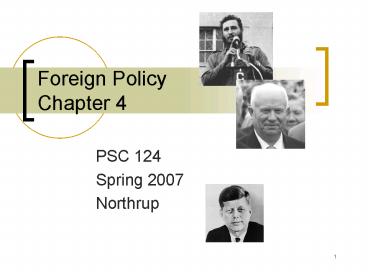Foreign Policy Chapter 4 PowerPoint PPT Presentation
1 / 27
Title: Foreign Policy Chapter 4
1
Foreign PolicyChapter 4
- PSC 124
- Spring 2007
- Northrup
2
Topics
- NOTES Extra credit, skip to ch.7 for Weds.
- Decision making
- Individuals as decision makers
- Group dynamics in decision making
- Crisis management (Cuban Missile Crisis)
- Substate actors
- Democracy and foreign policy
3
Foreign Policy
- Strategies used by national governments
- To guide their actions in international arena
- Policies specify objectives
- Describe means for achieving objectives
4
Mapping a Decision Rational Model
- Clarify goals
- Order goals (by importance)
- List the alternative actions
- Investigate consequences
- Choose based on best outcome (re self interest of
state)
5
Decision Making Feedback Loop
6
Always Rational?
Whats wrong with this picture?
7
Other Models
- Organizational process model SOPs
- Government bargaining model bargaining among
gov agencies - Realism?
8
Individual Decision Makers
- Always ultimate decision makers
- Understanding of individual psychology
- Systematic divergences from rationality
- Filtering and perceptions
- Affective bias
- Cognitive bias
9
Filtering and Perception
- Information screens
- Misperception
- Selective perception
10
Affective Bias
- Emotions (positive or negative) impact decisions
- Bush and Sadaam
- Lyndon Johnson and Vietnam
11
Cognitive Bias
- Cognitive dissonance
- Justification of effort Dollar Auction
- Enemy images
- Mirror image
- Projection
- Satisficing
12
Group Dynamics
- Can promote rationality
- Can promote irrationality
- Psychological dynamics occurring in groups (e.g.
groupthink) - Group decision making processes
13
Solomon Asch Experiments
A
C
B
- Conformity in groups (1950s)
14
Crisis Management
- Crises have particular characteristics
- Time pressure
- Importance of issue
- Inability to go through usual processes
- Communications shorter, more stereotyped
(heuristics) - Responses to crises
- Information discarded
- Stereotypes applied, often incorrectly
- Tendency to overlook creative solutions
15
Tversky and Kahneman
- Judgement under Uncertainty in Science 1974
- Representativeness heuristic
16
Steve
- Steve is very shy and withdrawn, invariably
helpful, but with little interest in people or in
the world of reality. A meek and tidy soul, he
has a need for order and structure, and a passion
for detail.
17
What is the probability that Steve is a
- Farmer
- Salesman
- Airline pilot
- Librarian
- Physician
18
Groupthink Antecedent Conditions
- Insulation
- High group cohesiveness
- Directive leadership
- Lack of norms requiring methodical procedures
- Member homogeneity
- High stress from external threats
- Low hope of a better solution
Above taken from http//en.wikipedia.org/wiki/Gro
upthink
19
Symptoms of Groupthink
- Illusion of invulnerability
- Belief in inherent morality of group
- Collective rationalization
- Shared stereotypes of outgroup
- Self-censorship
- Illusion of unanimity
- Pressure on dissenters
- Self-appointed "mindguards"
Text from http//en.wikipedia.org/wiki/Groupthink
20
Characteristics of Decisions
- Incomplete survey of alternatives
- Incomplete survey of objectives
- Failure to examine risks
- Failure to re-appraise rejected alternatives
- Poor information search
- Selective bias
- No contingency plans
21
The Bay of Pigs
- 1961 Castro overthrew Batista in Cuba
- Castro moved to align with USSR
- Eisenhower then Kennedy moved to overthrow
Castro - Worked with Cuban exiles to invade
- Kennedy thought could deny US involvement
- Used as example of groupthink
- Advisors met with Kennedy
- Wanted to continue to have access
- No devils advocate
Cuban poster warning of invasion
22
Cuban Missile Crisis
http//www.bbc.co.uk/history/state/monarchs_leader
s/kennedy_cuban_missile_01.shtml
- October 1962 evidence of Soviets setting up
nuclear armed missiles in Cuba - Khrushchev promised repeatedly - no missiles
- Set up ExComm (Executive Committee of the
National Security Council) to help make decision - Over 14 days many believe world came closest to
nuclear war - Have tapes of all ExComm meetings, so available
for study open process
23
Group Process
The tip of a Soviet R-12 (SS-4) medium-range
missile
- Learned from Bay of Pigs
- Different decision making model
- Wide variety of people
- President not in advisors meetings
- President came in intermittently
- Asked challenging questions, got honesty
- Process included challenging popular ideas
- Able to generate creative ideas
24
Avoiding Groupthink
- Authority placed in hands of single person who
goes to various others for advice - Pre-assign roles of dissent
- Randomly assign dissent for discussion
- Have outside inspector general assigned to
review
25
Current War in Iraq
- Senate Intelligence Committee report, July 2004
- Report on the US Intelligence Communitys Prewar
Intelligence Assessments on Iraq - Blamed groupthink for failure to interpret
intelligence correctly re WMDs
26
Substate Actors
- Bureaucracies (e.g. diplomatic corps)
- Interest Groups
- Public opinion
- Military industrial complex
- Legislatures
27
Democracy and Foreign Policy
- Differences in foreign policies of states most
influenced by form of government - Democratic peace
- Capitalism as basis?
- Exception to democratic peace transitional
democracies - Used by leaders as part of foreign policy
rhetoric George W.

